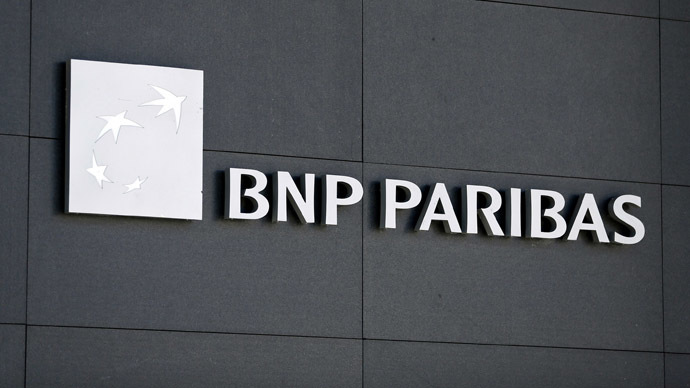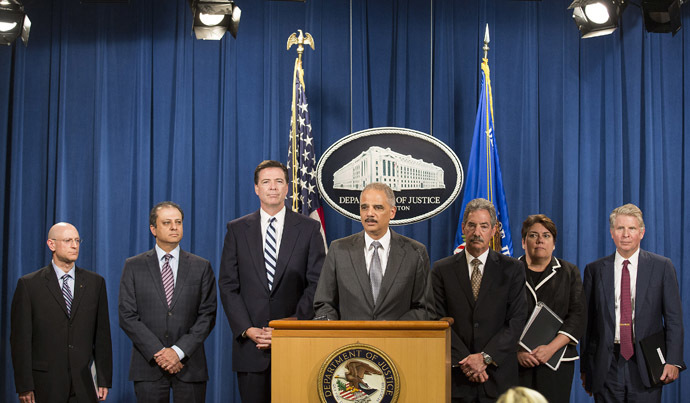Banking on sanctions - a step too far?

The US fining a French bank $9 billion may be one of the greater own goals in regulatory enforcement history.
Clearly BNP Paribas behaved badly. Clearly BNP Paribas behaved badly even according to the somewhat loose grasp on morality held by many bankers. By the time BNP Paribas endeavored to turn over a new leaf and informed US authorities that it had been breaking sanctions by trading with the likes of US pariah nations such as Cuba, Iran and Sudan, American authorities spat the dummy of full regulatory force.
US regulators demanded sackings, suspension (from the US dollar banking system) and that rather significant fine which puts double parking penalties in stark perspective.
The French government and the National Front have promptly called foul, convinced that those crazed neo-liberals of the United States have picked upon a Gallic icon and indirectly are waging war on the people of France. True, it does seem remarkable that in the same week that BNP Paribas was fined, so too the New York attorney general has decided that of all the dubious procedures on Wall Street, he has prioritized action against a platform operated by Barclays, a British bank.
In some European circles, a modicum of paranoia reigns, not helped by US spying allegations. There is a ring of truth that some European banks appear to have fallen foul of US sanctions laws despite adhering to the laws of their own countries. Given that much of the money which went to Sudan appears to have helped fund a regime of rape and pillage in Darfur, it is clear that BNP Paribas at least needs considerable work on its corporate social responsibility policy.
Had the money not been transferred through the US dollar payment system, US justice would not have had any jurisdiction. Moreover many feel the US justice system behaves like a kangaroo court against foreign firms. Had BNP Paribas not settled directly with government officials, a court case could have led to the French bank losing its US license, tantamount to a death sentence for an international financial institution. That a bank which transferred money to abet rape, pillage and murder can look like a victim does suggest the US regulatory system appears somewhat flawed.

However, there is a much larger loser in this whole situation. Eagerness to pursue any wrongdoing which touches the US dollar payment system is causing vast numbers of banks, in the USA and elsewhere to reconsider what was once a core of banking: money transfer. This is a potentially huge issue. Yes, transferring money across borders can indeed help fuel money laundering or the drugs trade and a catalogue of illegal activity. However, for every drug baron laundering money, millions of migrant workers transfer money to support families and relatives. Many recipients of these hard earned dollars are in the emerging world. Therein lies a problem as increasingly bank regulators view the rest of the world as too dangerous to service. Over $50 billion in annual remittances from the USA to Mexico alone are endangered. That’s a potential catastrophe for Mexican families and millions of others throughout the world could be affected by a dollar remittances shutdown.
Given that in any case bank payments, including the US-centric dollar system are pretty expensive (thanks to dated technology), it is perhaps unsurprising that many financial innovators are now focusing on finding ways around existing payments systems. Some, like Bitpesa use bitcoin technology, although given the cost of US regulation, this isn’t yet available in the US. Across the internet there are multiple possibilities using micropayments which offer cheaper alternatives to established dollar routing.
Many nations, increasingly concerned by US regulatory over-reach in the financial system and beyond are investigating alternative payment systems outside American jurisdiction. Nevertheless the US remains the dominant global currency: over 60 percent of central bank reserves are held in dollars, while some 87 percent of foreign exchange transactions involve the greenback.
Despite this dominance, heavy-handed regulation may yet drive the creation of alternative payment systems. Moscow has been considering such a move since a cack-handed attempt by President Obama to stop usage of MasterCard and Visa.
An alternative system for payment using the euro would be a logical step if it weren’t for the deeply flawed construction of Europe’s delusional monetary union. Nevertheless, the US cannot afford to rest on its laurels lest the move to free floating rubles or yuan help fuel an alternative trade currency, and nobody can afford to discount bitcoin either.
The statements, views and opinions expressed in this column are solely those of the author and do not necessarily represent those of RT.
The statements, views and opinions expressed in this column are solely those of the author and do not necessarily represent those of RT.













